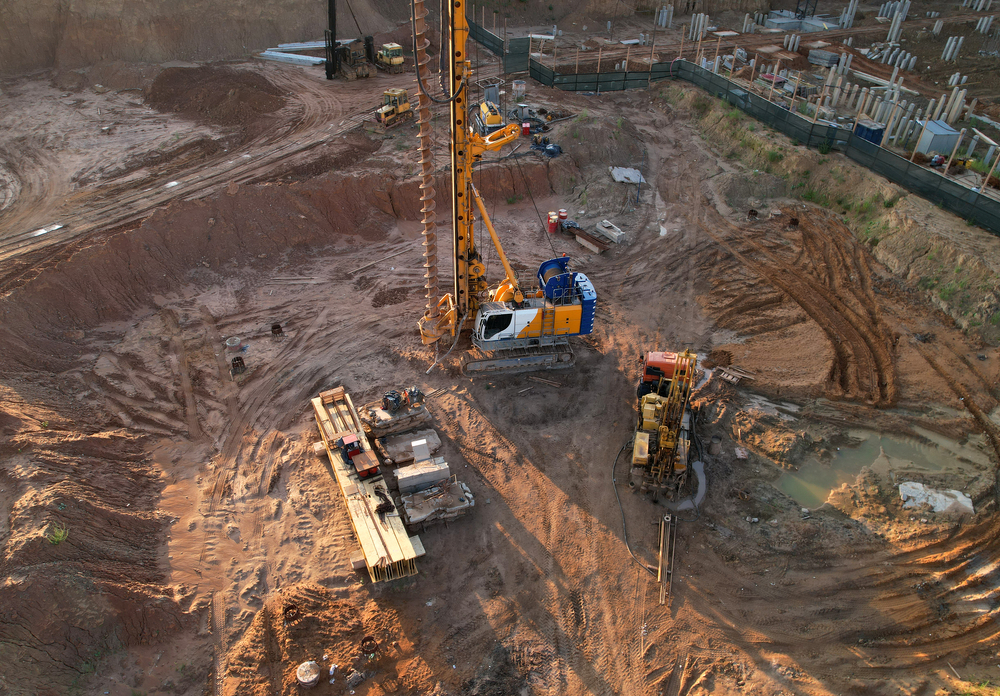Not known Incorrect Statements About Geotheta
Not known Incorrect Statements About Geotheta
Blog Article
Everything about Geotheta
Table of ContentsIndicators on Geotheta You Should KnowSome Known Incorrect Statements About Geotheta The Buzz on GeothetaThe 5-Minute Rule for GeothetaMore About Geotheta

They conduct site examinations, collect examples, perform lab tests, and analyze data to evaluate the suitability of the ground for construction tasks - Consulting Engineers. Based upon their findings, geotechnical engineers give recommendations for foundation style, slope stability, maintaining frameworks, and reduction of geotechnical dangers. They team up with other professionals, such as engineers, architectural designers, and building and construction groups, to make certain that geotechnical factors to consider are integrated into the overall project layout and execution
By assessing the actions and residential properties of soil and rock, they can identify possible geotechnical threats such as landslides, dirt negotiation, or incline instability. Their expertise aids prevent failures or crashes that can endanger lives and home. Right here are some in-depth duties and responsibilities of a geotechnical designer: Site Investigation: Geotechnical designers conduct site examinations to collect data on subsurface conditions.
They analyze the information to recognize the properties and behavior of the dirt and rock, including their stamina, leaks in the structure, compaction attributes, and groundwater problems. Geotechnical Evaluation and Design: Geotechnical designers analyze the data collected throughout site investigations to evaluate the stability and suitability of the site for building projects. They perform geotechnical estimations and modeling to examine aspects such as birthing capacity, settlement, slope stability, side earth pressures, and groundwater flow.
How Geotheta can Save You Time, Stress, and Money.
Structure Layout: Geotechnical designers play a crucial duty in designing structures that can safely support the intended framework. They analyze the soil problems and lots needs to establish the ideal structure type, such as superficial structures (e.g., grounds), deep foundations (e.g (https://www.awwwards.com/geotheta/)., stacks), or specialized techniques like dirt improvement. They take into consideration factors such as negotiation restrictions, birthing ability, and soil-structure interaction to create optimal foundation styles
They review building and construction strategies, screen site activities, and perform field assessments to verify that the design suggestions are followed. If unanticipated geotechnical problems emerge, they assess the scenario and offer referrals for remediation or adjustments to the style. Danger Evaluation and Reduction: Geotechnical engineers assess geotechnical threats and threats connected with the job site, such as landslides, liquefaction, or soil erosion.

Collaboration and Interaction: Geotechnical engineers function closely with other experts associated here with a job, such as designers, architectural designers, and construction teams. Efficient communication and collaboration are vital to incorporate geotechnical factors to consider right into the general project layout and building procedure. Geotechnical designers offer technical experience, solution questions, and make certain that geotechnical demands are satisfied.
Fascination About Geotheta
Right here are some kinds of geotechnical engineers: Foundation Engineer: Structure engineers concentrate on developing and examining foundations for structures. They assess the dirt problems, lots requirements, and website attributes to determine the most proper structure type and design, such as shallow structures, deep structures, or specialized techniques like stack structures.
They assess the aspects influencing slope stability, such as dirt buildings, groundwater problems, and incline geometry, and develop approaches to prevent incline failings and reduce risks. Quake Engineer: Earthquake engineers concentrate on analyzing and making structures to endure seismic forces. They analyze the seismic risk of a site, evaluate dirt liquefaction capacity, and establish seismic layout requirements to guarantee the security and resilience of frameworks during quakes.
They perform field screening, gather samples, and assess the collected data to define the soil properties, geologic developments, and groundwater problems at a website. Geotechnical Instrumentation Engineer: Geotechnical instrumentation designers concentrate on tracking and determining the behavior of dirt, rock, and structures. They mount and maintain instrumentation systems that keep an eye on elements such as soil settlement, groundwater degrees, slope movements, and structural displacements to evaluate efficiency and give early cautions of possible problems.
How Geotheta can Save You Time, Stress, and Money.
They perform examinations such as triaxial tests, debt consolidation examinations, direct shear examinations, and leaks in the structure tests to gather information for geotechnical analysis and layout. Geosynthetics Designer: Geosynthetics designers concentrate on the layout and application of geosynthetic materials, such as geotextiles, geogrids, and geomembranes. They use these products to enhance dirt security, enhance inclines, offer drain remedies, and control disintegration.
They have a tendency to be investigatory individuals, which indicates they're intellectual, introspective, and investigative. They are interested, systematic, reasonable, logical, and rational. Some of them are additionally social, meaning they're kind, generous, cooperative, person, caring, practical, empathetic, skillful, and friendly. Does this seem like you? Take our complimentary job examination to find out if geotechnical designer is one of your top job matches.
In the office environment, geotechnical engineers make use of specialized software devices to do estimations, develop designs, and assess information. They prepare reports, evaluation task specifications, communicate with clients and staff member, and coordinate project tasks. The workplace setup supplies a helpful atmosphere for study, analysis, and cooperation with various other professionals associated with the project.
Fascination About Geotheta
They frequently visit job websites to conduct website investigations, assess geotechnical conditions, and gather information for analysis. These sees involve traveling to different areas, often in remote or difficult terrains. Geotechnical engineers may execute soil sampling, conduct tests, and display building tasks to make certain that the geotechnical elements of the job are being implemented correctly.
Geotechnical engineers additionally function in specialized geotechnical laboratories. Geotechnical lab designers work thoroughly in these environments, managing screening tools, operating instruments, and videotaping data.
Report this page